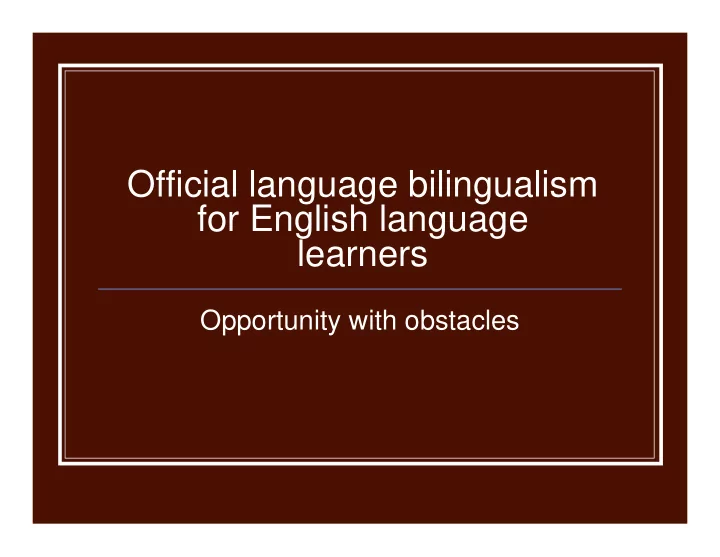

Official language bilingualism for English language learners Opportunity with obstacles
Opportunity � I like to learn French in Canada because I know English in India. I learn French during presentations and conversation. French is not difficult to learn.* (ESL participant A) � It’s easy (to learn French) here because we can talk. (ESL participant B) � It was easy to learn (French) here because…here we learned to speak. (ESL participant C) � I like to learn French in Canada because I like to learn about Canada. (ESL participant L) *Quotes taken from the student journals were reproduced here as written by the students.
Opportunity � It is more advantageous, like in India we know English as a second language, we have that advantage here with the French. French is the second language.” (Parent A) � We know English as a second language…we have our mother tongue so you see we are interested for French like this. (Parent B) � We know English as a second language; we have the advantage here with the French. (Parent C)
Opportunity � Motivation � Dagenais and Berron (2001, 1998) � Mady (2003)
Opportunity � Achievement � Calman (1988) � Hart, Lapkin & Swain (1988) � Bild & Swain (1989) � Mady (2006) � Carr (2007)
Obstacles � “We exclude ESL students from French - due to lack of English language knowledge at the time of entry to the school.” (secondary school principal B) � “They (ESL students) have a second language— English, and they are challenged dealing with one new language.” (secondary school principal C) � “Learning a third language is difficult when they are already learning a second language.” (head of guidance department B) � “They have a hard enough time learning English; we don't want to overwhelm them.” (head of guidance department C)
Obstacle � 53.8 percent (N=7), reported that ESL students do not take French � 46.2 percent (N=6) indicated that ESL students are sometimes included in French � 0 percent, no principal indicated that all ESL students were required to take French
Obstacle � 66.7 percent recognized that ESL students meet with a great deal of success in French � � 41.7% percent indicated that the ESL students met with great success in English classes
Obstacle Nationally � The Royal Commission of Bilingualism (1967) and Biculturalism recommended the study of French be limited to Anglophones � The Multilingualism Policy (1971), followed by the Multilingualism Act (1988), committed to help immigrants gain one official language, not both � Report from the Office of Official Bilingualism (2002) recognizes that immigration has an impact on bilingualism � The Next Act (2003) strives to double the proportion of secondary school graduates with a functional knowledge in their second official language
Obstacle Provinces/Territories � British Columbia and Ontario allow for exemption � Other areas do not refer to allophone students studying French in either their French or ESL curriculum documents � Taaffe, Maguire and Pringle (1996)
Obstacle � Calman & Daniel (1988) � Lapkin, MacFarlane & Vandergrift (2006)
Discussion � Beneficial to allophones � Benefits to official language bilingualism � Meet with success wheras they struggle elsewhere
Discussion � Beneficial to school communities � Supports government initiatives � Beneficial to Canadian society
Recommend
More recommend